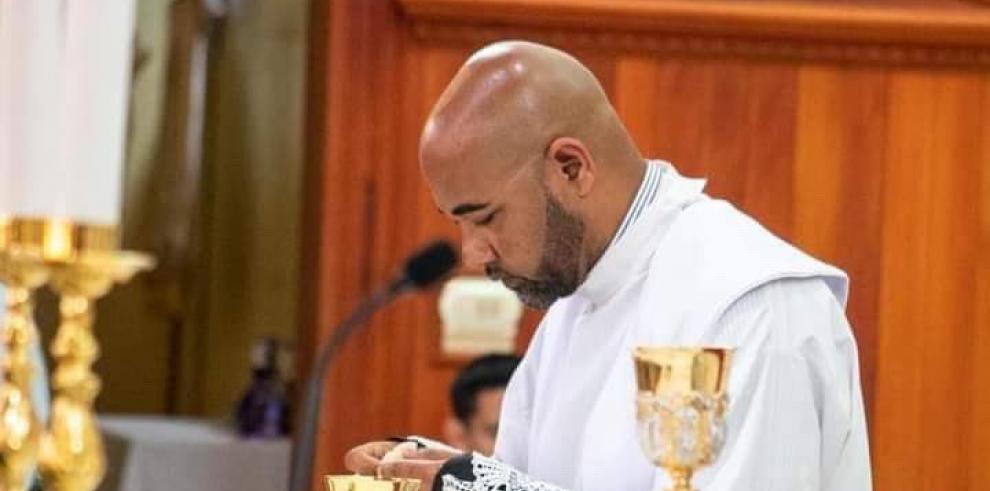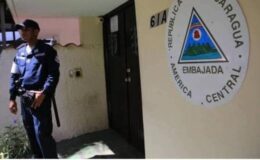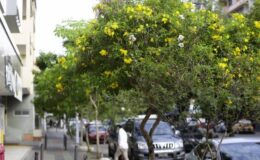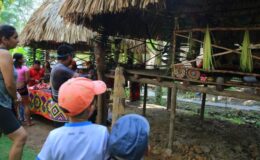Expelled Panamanian Priest confirms he was punished by Ortega party.
- By : James Bryson
- Category : Church, International Relations, Local Culture, Religion

The Panamanian priest Donaciano Alarcón confirmed that he was expelled from Nicaragua after the police authorities of that country accused him of preaching in favor of the Nicaraguan bishop Rolando Álvarez, who was sentenced to more than 26 years for crimes considered “treason”.
“On (Holy) Monday we had the Chrism Mass and it was there that they told me that I had been preaching in favor of Monsignor Álvarez, that he had been organizing some revolts against the Police, that he was disobeying the stipulations: zero processions,” the religious told journalists from the Honduran city of San Pedro de Sula, where he is located.
“The accusation was false. I told them no and they told me: well, this can be cause for expulsion because a rule has already been set and you are not complying with it,” he said.
Alarcón was expelled from Nicaragua to Honduras after celebrating the Eucharist on Monday to mark the start of Holy Week.
“I celebrated the Chrism Mass and when I left the mass, they (the police) were waiting for me and they took me out of my other companion’s car. They put me in a patrol car and took me to the border” with Honduras, he recounted.
To mention Monsignor, Rolando Álvarez
In his opinion, his expulsion was due to mentioning in his homilies “Monsignor Álvarez, who you know is a political prisoner for them (the government of President Daniel Ortega, and) that can be misinterpreted.”
He explained that during the liturgical, priests should pray for Pope Francis and for the bishops.
“We have to mention them, even if that makes them uncomfortable. It could be that (the cause of their expulsion),” he noted.
“Or it may be, and I am going to admit it publicly, that I have been reckless in some homily without realizing it,” he added.
On February 10, Bishop Álvarez, 56, was sentenced to 26 years and 4 months in prison, stripped of his nationality, and his citizenship rights suspended for life, for crimes considered “treason.”
The sentence against the high official was handed down a day after he refused to get on a plane that was going to take him, along with 222 other released Nicaraguan political prisoners, to the United States, which provoked the indignation of President Ortega, who described it as ” arrogant”, “unhinged” and “energetic”.
One day after Ortega’s speech, and despite the fact that the trial was scheduled for February 15, a Nicaraguan judge declared the religious a traitor to the country and author of four crimes to the detriment of society and the State of Nicaragua.
Church of Nicaragua suffers restrictions
On the other hand, the Panamanian priest confirmed that there are “restrictions” for the Catholic Church in Nicaragua.
“There are restrictions. We cannot have processions (in the streets), and you have to be very careful what you talk about,” he said.
He clarified, however, that the Nicaraguan authorities have not prevented them from celebrating Eucharists, their priestly formations, “or being with the people, only public demonstrations.”
He explained that the authorities restricted the processions in the Nicaraguan streets during Holy Week, because “they do not want public demonstrations.”
Despite these limitations, he assured that Pope Francis encourages them to continue “with the people and to emphasize fraternity,” and, in his case, although he was expelled by the Nicaraguan government, “not even they are my enemies.”
Alarcón, who was in charge of the parishes in the municipalities of San José de Cusmapa and Las Sábanas, both in the department of Madriz, on the border with Honduras, said that he has avoided having contact with the Nicaraguan faithful “because we have to protect our people “.
He also stated that the Hondurans received him very well after being expelled from Nicaragua, where the authorities warned him that “he could no longer enter Nicaragua,” that it was “a decision of the State,” but that he was not mistreated.
Relations between the Government of Daniel Ortega and the Catholic Church are now experiencing moments of great tension, marked by the expulsion and imprisonment of priests, or the prohibition of religious activities.
President Ortega has called priests, bishops, cardinals and Pope Francis a “mafia”, who has branded the Sandinista government a “rude dictatorship” and has pointed out “an imbalance of the person who leads” the Central American country, one of the most poor of the continent.



No Comments